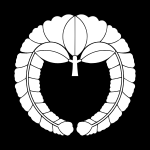Fujiwara clan
| Fujiwara clan 藤原氏 |
|
|---|---|

Mon: Sagarifuji
|
|
| Home province | Yamato Province |
| Parent house | Nakatomi clan |
| Founder | Fujiwara no Kamatari |
| Founding year | 668 |
| Cadet branches | |
Fujiwara clan (藤原氏 Fujiwara-uji or Fujiwara-shi?), descending from the Nakatomi clan and through them Ame-no-Koyane-no-Mikoto, was a powerful family of regents in Japan.
The clan originated when the founder, Nakatomi no Kamatari (614–669), was rewarded by Emperor Tenji with the honorific "Fujiwara", which evolved as a surname for Kamatari and his descendants. In time, Fujiwara became known as a clan name.
The Fujiwara dominated the Japanese politics of Heian period (794–1185) through the monopoly of regent positions, sesshō and kampaku. The family's primary strategy for central influence was through the marrying of Fujiwara daughters to emperors. Through this, the Fujiwara would gain influence over the next emperor who would, according to family tradition of that time, be raised in the household of his mother's side and owe loyalty to his grandfather. As abdicated Emperors took over power by exercising insei (院政, cloistered rule) at the end of 11th century, then followed by the rise of warrior class, the Fujiwara gradually lost its control over mainstream politics.
Beyond the 12th century, they continued to monopolize the titles of sesshō and kampaku for much of the time until the system was abolished in the Meiji era. Though their influence declined, the clan remained close advisors to the succeeding Emperors.
The Fujiwara clan's political influence was initiated during the Asuka period. Nakatomi no Kamatari, a member of the lower-nobility Nakatomi family led a coup against the Soga in 645 and initiated a series of sweeping government reforms that would be known as the Taika Reform. In 668 Emperor Tenji (reigned 668–671), bestowed the kabane Fujiwara no Ason (藤原朝臣?) on Kamatari. The surname passed to the descendants of Fujiwara no Fuhito (659–720), the second son and heir of Kamatari, who was prominent at the court of several emperors and empresses during the early Nara period. He made his daughter Miyako a concubine of Emperor Monmu. Her son, Prince Obito became Emperor Shōmu. Fuhito succeeded in making another of his daughters, Kōmyōshi, the empress consort of Emperor Shōmu. She was the first empress (like Empress Wu in China) consort of Japan who was not a daughter of the imperial family itself. Fuhito had four sons; and each of them became the progenitor of a cadet branch of the clan:
...
Wikipedia
